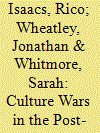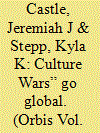|
|
|
Sort Order |
|
|
|
Items / Page
|
|
|
|
|
|
|
| Srl | Item |
| 1 |
ID:
180488


|
|
|
|
|
| Summary/Abstract |
In the last decade the term culture war has become hard to avoid. If it is not yet the buzzword of the first part of the twenty-first century, it soon will be. Culture wars seem to be around us everywhere. Each passing week brings some new mention of an outbreak in a public institution, civic space or political arena in some part of the globe. Culture wars are the phenomenon we cannot seem to shake. Battle lines are drawn, rhetorical tools are sharpened and social media awash with vitriol and moralising, and seemingly unbridgeable social gaps. If the immediate post-Cold War period did usher in an era of universal global liberalism, decades on it is now far in the distance, only visible in the rear-view mirror. Instead, around us lie social and political fault lines featuring competing visions of what should be the appropriate normative basis upon which societies should be constituted. They are debates that focus on belonging, on citizenship, on rights and identities.
|
|
|
|
|
|
|
|
|
|
|
|
|
|
|
|
| 2 |
ID:
184474


|
|
|
|
|
| Summary/Abstract |
Religious identities based on both religious tradition and religious commitment have been increasingly influential in domestic U.S. politics for several decades, but the assumption remains that such identities are mostly unrelated to foreign policy. The authors suggest that domestic political incentives to expand the culture wars have combined with other trends, including the increasing use of unilateral executive power in foreign policy, to create an environment in which policymakers increasingly are tempted to make foreign policy based on domestic political incentives. Three case studies are highlighted: the “Mexico City” policy requiring foreign non-governmental organizations (NGOs) receiving U.S. aid money to pledge not to provide or educate about abortion, moving the U.S. embassy in Israel from Tel Aviv to Jerusalem, and efforts in the Trump administration to ban travel to the United States from majority-Muslim nations.
|
|
|
|
|
|
|
|
|
|
|
|
|
|
|
|
| 3 |
ID:
172392


|
|
|
|
|
| Summary/Abstract |
Anyone who attempts to understand and reverse the major defeat suffered by Labour in the December 2019 general election needs first to appreciate why comparisons with the defeats of the 1980s are so unhelpful. In 1983 Labour was all but wiped out across southern England, but held on comfortably across the ‘red wall’. By contrast, in 2019 Labour did well in cities and university towns across the south, and appears to have solved its historic problem with the southern, educated middle class. However, this has been at the expense of alienating working class voters across the country, not just in its former industrial heartlands. But this is not inevitable. A reanalysis of testimony from hundreds of interviews with working people across England from the 1940s onwards allows insights into attitudes and values that are often obscured by survey techniques. Crucially, it points to a broad‐based vernacular liberalism at odds with the culture wars model of a terminal crisis for social democracy.
|
|
|
|
|
|
|
|
|
|
|
|
|
|
|
|
| 4 |
ID:
186637


|
|
|
|
|
| Summary/Abstract |
In trying to understand the post-9/11 historical moment, historians such as Beverly Gage and Melani McAlister have argued that despite the popular notion that “everything changed” on September 11, 2001, historical continuities shaped the way Americans understood, debated, and responded to this event.1 Historical actors integrate their interpretations of terrorism intro pre-existing ideas, identities, and political goals, fashioning narratives that transform terrorism into a resource for advancing other priorities. Gage describes this dynamic as the “external story” of terrorism, or “the response of the state and society to such challenges, whether in cultural, political, or social terms.”
|
|
|
|
|
|
|
|
|
|
|
|
|
|
|
|
| 5 |
ID:
131687


|
|
|
|
|
|
|
|